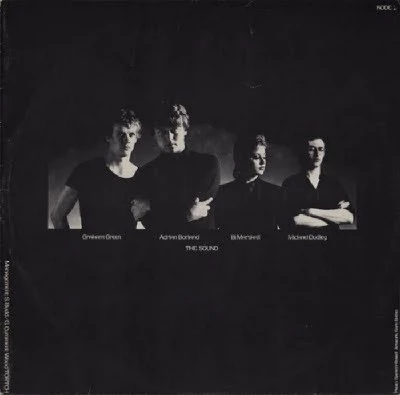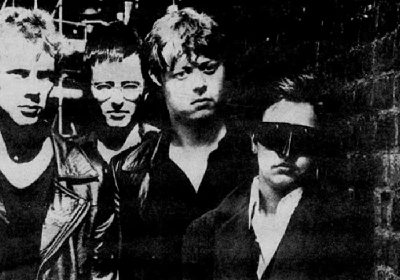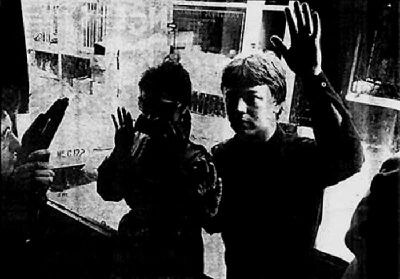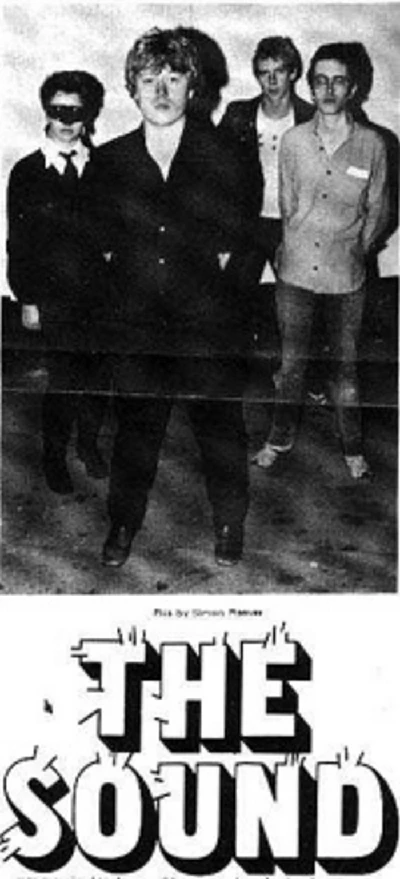Sound
-
Interview with Bi Marshall Part 1
published: 3 /
4 /
2014
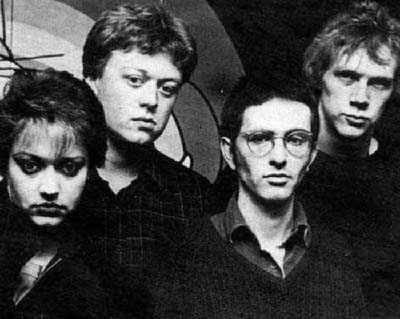
In a two part interview, both parts of which we are publishing consecutively, John Clarkson speaks to Bi Marshall, the original keyboardist with 80's new wave/post punk act The Sound, about her former band and its late front man, Adrian Borland
Article
“I find it hard to listen to Adrian singing now,” says Bi Marshall. “When you have worked with someone, and you’re used to them standing on stage next to you and to hearing their voice, and then they are not there anymore, then that feels really strange. I don’t tend to listen to ‘Jeopardy’ or any of the other records much anymore.”
Marshall is sitting at a table in the Morris room of the café in the V & A Museum in central London, and is talking to Pennyblackmusic about her late friend Adrian Borland and the bands they used to play in together, The Outsiders and The Sound.
The V & A and its tea rooms are regular haunts for Marshall. She is a professional artist now, and a Member of the V & A which houses the world’s largest collection of decorative arts and design. Other than answering some email questions for its website when the now defunct Renascent label reissued the Sound’s catalogue back in 2002, the interview with Pennyblackmusic is her first in over thirty years and since she left the band.
There have been many casualties in rock and roll over the years, but the story of the Sound and the disintegration of Adrian Borland, who was its vocalist and guitarist, is, however, especially poignant.
Adrian Borland formed the Outsiders, his first band, while he was still at school in his native Wimbledon in South London. The group - often seen to be the first punk band to self-release an album – put out two albums, ‘Calling On Youth’ (1977) and ‘Close Up’ (1978), on Borland’s parents’ label, Raw Edge Records. When their drummer Adrian Janes left to go to university in Wales in late 1979, the Outsiders morphed into the Sound with Marshall (keyboards) and Graham Bailey (bass), both of whom had played in the latter-day Outsiders, and new drummer Michael Dudley all on board.
The Sound signed to Korova, a subsidiary of Warners, of which the only other act on the roster was Echo & The Bunnymen. Their debut album, ‘Jeopardy’, upon which Marshall’s cascading keyboard lines were a vital part, came out in late 1980. It won the Sound much critical acclaim for both its anthemic sound and Borland’s brooding vocals, but sold only modestly. When the Sound’s subsequent two albums, ‘From the Lion’s Mouth’ (1981) and ‘All Fall Down’ (1982), also didn’t sell well, they were dropped by Korova.
The group would release two other studio albums, ‘Heads and Hearts’ (Statik, 1985) and ‘Thunder Up’ (PIAS, 1987), but by now Borland was showing regular signs of severe mental illness and had been diagnosed as having a schizoid-affective disorder. Over the following years, he would suffer manic depressive episodes and from hallucinations and paranoia. There were times in which he would be sectioned, and others in which he would attempt suicide. After the Sound broke up in early 1988, Borland adopted a more low-key solo career. In the second week of recording his sixth and final album ‘Harmony and Destruction’, Borland began to show symptoms of anxiety and illness again. He died aged 41 on the early morning of the 26th April 1999 after he threw himself in front of a train at Wimbledon Station.
In the years since the Sound’s break-up, their music has gone through a partial revival of fortunes and has been discovered by a new audience. To coincide with the fifteenth anniversary of Adrian Borland’s death, a four CD Sound box set containing the first three albums plus a variety of live and other extra tracks is being released. A Dutch fan and film producer Jean-Paul van Mierlo is also currently trying to gain crowd funding to make a documentary about Adrian Borland’s life.
Bi Marshall left the Sound early on, shortly after the release of ‘Jeopardy’ and the band completed a major UK tour in support of Echo & The Bunnymen. She worked with Adrian Borland for three years, between late 1977 and early 1981, and tells Pennyblackmusic, “I was but a small part in the overall history of The Sound.”
At one level it is true; at another she is understating herself. They were three crucial years in Adrian Borland’s development as a songwriter. They were also years that saw her rise through the ranks, starting out by playing her metal clarinet in the final numbers at Outsiders gigs, and which concluded with her striking keyboard arrangements providing the blueprint for much of what was to follow in the Sound even after her exit.
As well as ‘Jeopardy’, Marshall also made appearances on three other of Borland’s albums. There was ‘Propaganda’, a collection of Outsiders and early Sound recordings, which came out originally in 1999 upon the day of Borland’s suicide, and ‘The BBC Recordings’, another 2004 post break-up release, which comprised together all of the Sound’s recordings for the BBC, including the band’s first radio session (which involved Marshall) for Mike Read in October 1980. Marshall also brought her clarinet to ‘A Simple Vision’, a little-heard album that was recorded in a day by a one-off experimental project The Crazies, and which saw the first pairing of Borland and Pete Williams (‘Lord Sulaco’), who would eventually later make another three albums together under the name of the Honololu Mountain Daffodils.
It has never been very clear why Bi Marshall left the Sound, and over the years a variety of conflicting stories have circulated. It has been said that she quit to join the New Romantic movement, and also that she was unhappy with the direction that the group was heading and wanted to make music with an art statement. The truth is both more complex and also a lot sadder. “I was fired,” she says simply. “Adrian and I had an argument a few days after the Echo & The Bunnymen tour ended.” Her sacking – perhaps even then an early indication of Borland’s growing sense of paranoia - is not something that she wants to make a prime focus of the interview. “Adrian is no longer around to answer for himself,” she points out, and, while she was ostracised from the band for a while, she has remained close friends with both Graham Bailey and the Outsiders’ Adrian Janes. Marshall and Adrian Borland also to a degree patched their quarrel up, re-establishing a friendship of sorts in the years before his death.
In a long interview, which we are splitting into two parts, both parts of which we are running consecutively, Bi Marshall spoke about her often bittersweet memories of the Outsiders and the Sound and Adrian Borland.
PB: How did you first become involved with Adrian Borland and The Outsiders originally?
BM: I was in the first year of doing a Psychology degree, and a friend of Adrian’s was on my course. We happened to be talking about music, and when I told him the bands that I liked – Kraftwerk, The Stooges, early Roxy Music - he said, “My God, I have got a friend who has got exactly the same tastes as you. He is the only other person with I know with such bizarre tastes (Laughs). I must introduce you both,” and that friend was, of course, Adrian.
I met Adrian, Adrian Janes and Graham Bailey – the Outsiders as they were then - all together. They all came over from Wimbledon together to Camberwell where I then lived. Adrian didn’t drive, and Graham had to bring him over, and ‘Jan’, as we still call him, came along too. I met all three of them on the same night.
PB: What was your musical background? You played both clarinet and saxophone for the Outsiders. How experienced were you in both of those?
BM: My first instrument was the piano. I had started learning that when I was eight. I was better on the clarinet than the saxophone. I had been playing the clarinet for about four years by the time I first met Adrian, and I had just taken up the sax.
PB: How did you go from that initial meeting to playing with them?
BM: Adrian was very open-minded. It was one of the things that I liked about his attitude to music. He used to invite friends to listen to what he had been doing, and then if you came up with an idea it was always with him a case of “Oh, why don’t we try it?” and that was how it evolved.
BM: By then I had started going out with Graham. We dated for a while, and I went to an Outsiders rehearsal as Graham had replaced Bob Lawrence on bass. I was just sitting there at a rehearsal, and I must have been humming or something as Adrian said, “Don’t you play anything, Bi?” I said, “Well, actually I play the piano,” and then he said, “That’s a bit big. Don’t you play anything else?” Then when I told him that I also played the clarinet he asked me to bring it along to the next rehearsal.
They had some quite raucous songs. They used to finish quite often with the MC5’s ‘Looking at You’, which was always on the Outsiders’ live schedule. He said, “Why don’t you do some wild stuff over the top? We just want some screeching.” So,I started coming on for the last three or four tracks at Outsiders gigs. I have never counted myself as being in the Outsiders as I never recorded with them. It was strictly live, and always for the last three or four songs and the encore.
PB: Was your first experience in the studio making The Crazies album, ‘A Simple Vision’?
BM: Yes it was. It was recorded with Pete Williams, who became Lord Sulaco. He was a friend of Adrian’s. He was one of The Crooked Billet crowd. We used to call them the Crooked Billet crowd because they all used to meet at the Crooked Billet pub in Wimbledon, and Pete was part of that group.
Pete was working full-time and had a bigger budget than any of the rest of us, and one night down the pub he said to us, “Well, if I write the lyrics will you guys write the music to go with my lyrics?” The thing with Pete was that he always coming up with these schemes that never really amounted to very much (Laughs), and we said, yes, that we would and didn’t think about it any further. Then a couple of months later he said, “Oh, by the way I have finished my set of lyrics, and I have booked a studio.” We looked at the lyrics, and they were quite, well, odd (Laughs).
PB: They’re quite offbeat and sick, aren’t they?
BM: I said to him, “How did you come up with these lyrics”? And he said “Well, I got a newspaper and looked through it and at the headlines and decided to go from there.” He had decided to write each song about some of the more bizarre articles that were in the newspaper.”
There were a lot of protests at the time. People would pour petrol on themselves and set them alight, and so that became ‘Scorch Torch’. Someone had lost a hand in a farming accident, and had - I think – one of the first hand grafts, and that became ‘Flipper’. He had taken every song from a story in the paper.
PB: How much of that album was improvised?
BM: We hadn’t got together and prepared anything. We had been taken by absolute surprise when he presented them to us. It was totally improvised (Laughs).
PB: The Outsiders have been described in those final days before Adrian Janes left to go to university as making a “unique wailing sound.” There is an element of that on ‘A Simple Vision’.
BM: That may have been down in part to the clarinet. As I didn’t have a clarinet, I had to borrow one from school when I first started playing it, and the only one that was left was a rare metal one that nobody wanted to use. I was quite happy because it sounded like more like a soprano sax. When I left, nobody else wanted to use it, and they said, “Oh, well, you can carry on using it. If we ever want it back, we will get in touch. When the school closed down some years later, I had to return it and I had to go to a lot of trouble to replace it (Laughs). It was called a Regent. It was a clarinet that was made to play with marching bands.
PB: You get the impression if you listen to ‘A Simple Vision’ that you had a great time recording it.
BM: It was the most fun project that I had ever worked with on Adrian. We weren’t under any real pressure. Pete paid for it. It was his lyrics. The studio was booked for a day. There was a certain amount of pressure to complete it in a day, but that was all.
PB: Did you record all seven songs on it in a day?
BM: Yeah, and then Pete and Adrian went back and mixed it in another day.
PB: Who appeared on it?
BM: Adrian Janes was on drums, Graham was on bass, Adrian Borland was on guitar, and there was Pete/Lord Sulaco on vocals and me on my wailing clarinet (Laughs).
PB: Pete and Adrian went on to play together again in the Honolulu Mountain Daffodils. Do you see the Honololu Mountain Daffodils as being a continuation of the Crazies?
BM: I didn’t hear the Honolulu Mountain Daffodils’ three albums when they came out and until some years later, but when I eventually I heard them I thought exactly that - “Oh, it is a continuation of the Crazies” (Laughs). They maintained that same feeling of energy and spontaneity.
PB: That album has never been officially released. Why was that?
BM: That was down to Pete. He wanted to make up a few tapes, and distribute it amongst his friends. There was never any intention to release it.
PB: How much rehearsing had you been doing up until that date? It is hard to believe that you pulled something together so spontaneously.
BM: It echoed the way we were. Adrian might have a set of lyrics. Sometimes he would write them on his own, and sometimes at that stage he was still writing with Adrian Janes. He might say, “I see these lyrics as having an upbeat song,” so he already had in mind the sort of song that he thought that it might become, and then we would start jamming and it would be a case of that bit works, that bit doesn’t. We were quite used to going in and improvising.
PB: Where did the Crazies get their name from? Was it from the George Romero film?
BM: Yes, it was. We were all quite keen on Romero and on horror films.
PB: Shortly after that the Outsiders came to an end when Adrian Janes left, and then became The Sound when Michael Dudley joined on drums. At what point did you become a permanent member of the Sound?
BM: I suppose it was when I got my first keyboard. It had been built by a friend and was very, very unreliable, so much so that that friend had to come along in the back of the van to the gigs as every time it got shaken up the soldering would become undone. We had an old ambulance that used to take us to the gigs, and we would get to the gig and everything would be unsoldered, and the friend would have to re-solder it.
The Sound were actually playing a gig that night on the very first night that I turned up with my keyboards. There I was thinking that I would just be coming on for a few numbers with my metal clarinet as usual, and Adrian being Adrian said, “Now you have got the keyboards you might as well play the whole set” (Laughs).
PB: Was it a disaster?
BM: No, it was absolutely note perfect. I was so scared that I memorised everything in its total place. It was one of the few times that Adrian turned around to me afterwards and went, “That was amazing.”
We started at about two in the afternoon, and must have to leave at about 5.30 p.m. to go to the sound check. From what I remember Adrian and I were there all the time, and then I think the other two came in for a bit. I had sat in on a lot of rehearsals, and knew the tunes. It was just a case of remembering one track from another. I was suddenly faced with ten songs, and my main worry was that I would start playing the keyboard line for the wrong song (Laughs).
PB: You played the piano as well, so at one level it would not have been too much of a jump upwards to play keyboards.
BM: The piano had been my first instrument. That first keyboard that had been built by a friend didn’t really have very much in the way of gizmos on it. It was very straightforward, almost like an electric piano. You couldn’t modify the sound with it. It wasn’t big. It was a very standard keyboard, but because it was unreliable it was a lot of pressure to play it.
PB: How long did you have that keyboard for?
BM: Probably about two or three months, and then it just became too much. The friend always had to come along. If we were playing on a week night and he was working, then it was tricky for him to come to some of the gigs.
PB: About that time you recorded ‘Propaganda’. It has been described as the Sound’s “true debut album.” Was there ever any intention to release it?
BM: No. As Adrian’s father had recording facilities, we would sometimes go around to the Borlands’ house and record things, just so we could listen back to them and monitor our progress. There was never any original intention to release that as an album. It only came out years later when Renascent started releasing the Sound’s back catalogue.
PB: Mike Dudley has described ‘Propaganda’ as being the Sound’s best album. Would you agree with that?
BM: No (Laughs). There are some nice songs on it, which were later dropped. I love ‘Statik’, for example. I voted for that one to go on ‘Jeopardy’ rather than ‘Word Fails Me’. There are things on there that I am glad to hear again, but on the whole I wouldn’t say that it was my favourite.
I am also not sure who plays on all those tracks. It was recorded in late 1978 and early 1979 at the tail end of the Outsiders and the very beginning of the Sound. I couldn’t tell you now which tracks were recorded with Adrian Janes and which ones were with Dudley. You will probably find that about half of those are Adrian Janes. I didn’t play keyboards on it at all, just the clarinet and the saxophone, and I didn’t appear on all of the tracks.
PB: As well as the Sound, Adrian and Graham also started at about that time an electronic side project, Second Layer. How involved were you in that?
BM: It was always Adrian and Graham’s side project and very much a two person thing, but if I was there at rehearsals and came up with an idea and if Adrian liked it then he would invite me in to help out with the recording of it. He was always good at allowing different people credit in that way.
I didn’t appear on their album ‘World of Rubber’, but I did make brief appearances on their two earlier EPs, ‘State of Emergency’ and ‘Flesh as Property’. On ‘State of Emergency’ I had the idea of reciting the definition of dissection on a track called ‘The Cutting Motion’, which Adrian thought was a good idea, and so I came in to do the vocals on that. With ‘Metal Sheet’ on ‘Flesh as Property’ I said to him, “You should have a beeping noise like a heart monitor on a life support machine,” and he said, “That is a good idea. How would we do that?” And he had a go on the his WASP synth and it sounded absolutely dreadful as it is really difficult to play the cardboard keys due to the electro-static sensors. You had to be really precise, hitting it right in the middle of each note as otherwise it wouldn’t sound at all, and so he said, “When we go into the studio, you’d better come and do it because you are the only one who can.”
PB: Do you think because the Sound had such a distinctive sound Second Layer simply provided him with another outlet for his creativity?
BM: I think so. As his musical tastes were so diverse, I think that Second Layer satisfied another part of him. As well as allowing him some creative freedom and filling that need to be more adventurous, those side projects of his like Second Layer and the Honolulu Mountain Daffodils were a lot more low-key. There was no pressure there.
Both those EPs were produced like the Crazies album and ‘Jeopardy’ by Nick Robbins at Elephant Studios. Nick and Elephant Studios were an important part in the early history of Adrian's career and collaborated on all the early projects. We got on well with him, and he was always easy to work with. He always understood what we were aiming for without us having to explain it to him.
PB: How did the deal with Korova come about?
BM: The Sound were approached by them. At the time we were quite reluctant to sign with a big label. If I remember correctly, both EMI and Korova were interested simultaneously in signing us. We dismissed EMI, but decided to sign to Korova because, even though they were part of Warner Brothers, they were supposed to be a new subsidiary that was going to concentrate on independent bands.
PB: There seems to have been some conflict in the band about this. Mike Dudley has said that he wanted to be a rock star, while the other members of the Sound including yourself were much more interested in being an independent band.
BM: I think that is true. We didn’t share the same musical tastes as Mike Dudley. He was eight years older than us. When you are in your early twenties and somebody is that kind of age older than you, it can make a huge difference. He was living in a squat, while we were all still living at home. He was in a way much more grown-up and he was not from London. He had totally different ambitions as well as totally different tastes in music. I think that he thought that a lot of the stuff we were doing was too way out. I can believe that was what he said.
PB: In some ways Korova must have seemed then like the ideal label for the band, being a major label but also at one level an independent label.
BM: They were in many ways. We signed to them on the 21st July 1980. I remember this because I recently had to search out my copy of the contract to send to Warners in order to have my performance royalties paid to me.
At the beginning we dealt there with a really nice guy called Greg Penny. He was an ex-keyboard player and he had been a musician himself, and he was really, really good to work with.
PB: How often were you rehearsing at that stage?
BM: Probably about two or three times a week.
PB: That was quite a commitment really.
BM: It was because Graham had a full-time job at the BBC, and I was coming up to doing my finals. On week days we would rehearse from about 6 p.m. to 10.30 p.m. and then I had to get the last train back to Camberwell.
PB: Was Adrian working?
BM: He was. I think he worked part-time in a photographic shop. I can’t remember exactly what Dudley was doing. I think he was working in a restaurant or a kitchen. It was at one level a lot of pressure, but it was do-able because Adrian, Graham and I we were all really good friends. We would rehearse, and then especially at weekends go out and socialise. I never really socialised with Dudley, but certainly Graham, Adrian and myself used to hang out together.
Band Links:-
http://www.brittlehaven.com
Picture Gallery:-
